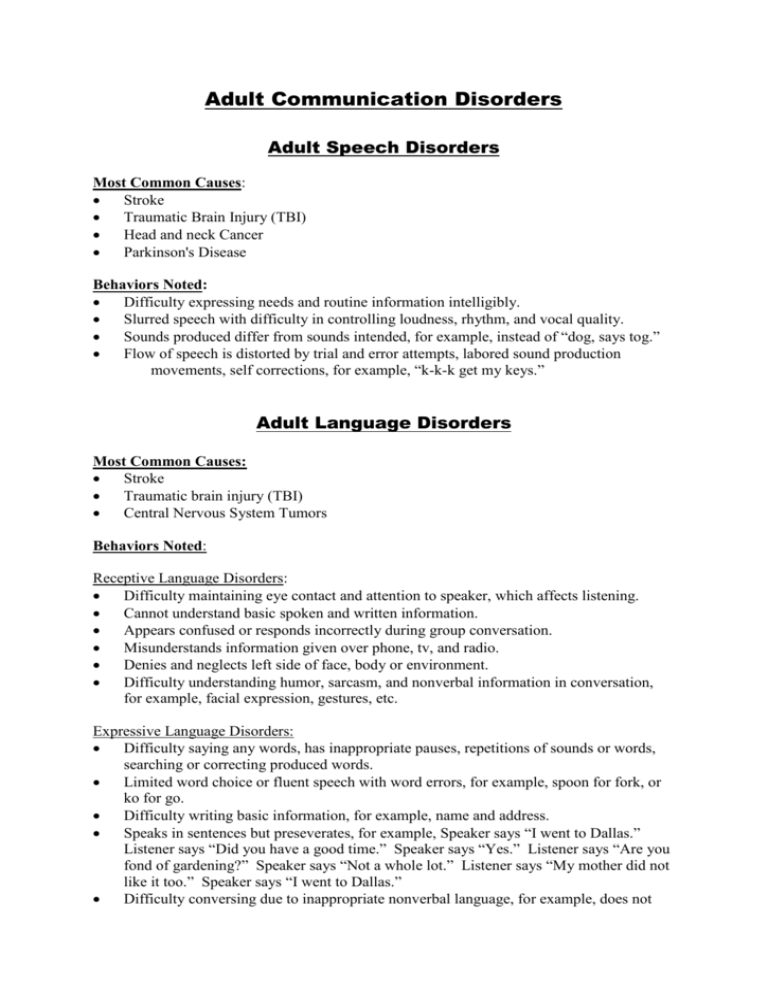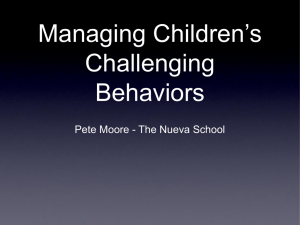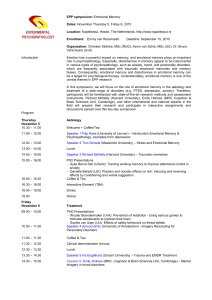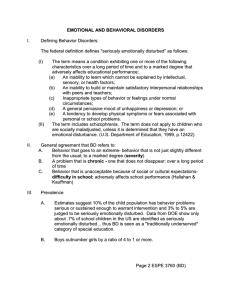Adult Disorders
advertisement

Adult Communication Disorders Adult Speech Disorders Most Common Causes: Stroke Traumatic Brain Injury (TBI) Head and neck Cancer Parkinson's Disease Behaviors Noted: Difficulty expressing needs and routine information intelligibly. Slurred speech with difficulty in controlling loudness, rhythm, and vocal quality. Sounds produced differ from sounds intended, for example, instead of “dog, says tog.” Flow of speech is distorted by trial and error attempts, labored sound production movements, self corrections, for example, “k-k-k get my keys.” Adult Language Disorders Most Common Causes: Stroke Traumatic brain injury (TBI) Central Nervous System Tumors Behaviors Noted: Receptive Language Disorders: Difficulty maintaining eye contact and attention to speaker, which affects listening. Cannot understand basic spoken and written information. Appears confused or responds incorrectly during group conversation. Misunderstands information given over phone, tv, and radio. Denies and neglects left side of face, body or environment. Difficulty understanding humor, sarcasm, and nonverbal information in conversation, for example, facial expression, gestures, etc. Expressive Language Disorders: Difficulty saying any words, has inappropriate pauses, repetitions of sounds or words, searching or correcting produced words. Limited word choice or fluent speech with word errors, for example, spoon for fork, or ko for go. Difficulty writing basic information, for example, name and address. Speaks in sentences but preseverates, for example, Speaker says “I went to Dallas.” Listener says “Did you have a good time.” Speaker says “Yes.” Listener says “Are you fond of gardening?” Speaker says “Not a whole lot.” Listener says “My mother did not like it too.” Speaker says “I went to Dallas.” Difficulty conversing due to inappropriate nonverbal language, for example, does not take turns or gets too close to speaker, etc. Right visual field of each eye is impaired, can write from dictation, but cannot read it. Adult Swallowing Disorders Most Common Causes: Stroke Traumatic brain injury (TBI) Head and neck cancer Parksinson's Disease Behaviors Noted: Absent/weak cough reflex. Wet gurgly voice. Breathy hoarse voice. Poor respiratory control during eating. Frequent coughing/choking. Food stays in mouth after eating. Food leakage/drooling. Difficulty chewing meat or crunchy food. Adult Cognitive Communication Disorders Most Common Causes: Stroke Traumatic Brain Injury (TBI) Alzheimer's Disease Brain tumors Behaviors Noted: Unresponsive to all stimuli. No purposeful speech. Extremely impaired memory and attention with impulsivity. Limited eye contact. Limited social behaviors, for example, expression of courtesy and facial expressions. Off topic responses. Limited problem solving and judgment. Difficulty anticipating consequences of own actions. Difficulty planning and executing daily activities. Adult Fluency Disorders Most Common Causes: Functional stuttering or cluttering Stroke Behaviors Noted: Disfluencies or disruptions in natural, smooth flow of speech that may be characterized by: - Part word repetitions (ba-ba-ba-baby). - Sound repetitions (m-m-m-my). - Sound prolongations (mmmmy). - Loss of rhythm due to tensing or improper stress, timing, for example, “She wwwas going-- home.” - Secondary sounds or facial/body movements designed to distract listener and facilitate fluent speech become habitualized. - Stoppage of airflow. - Very fast speech rate or unintelligible segments of speech. Adult Voice Disorders Most Common Causes: Structural: Vocal nodules Laryngitis Head and neck cancer Movement: Parkinson's Disease Vocal fold paralysis Behaviors Noted: Breathy and/or hoarse voice. Reduced loudness. Too nasal voice. Unable to sing or achieve higher notes. Too high or too low pitch.







